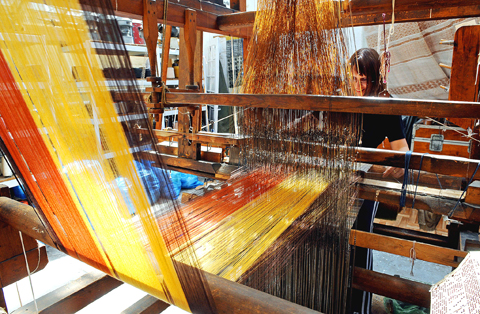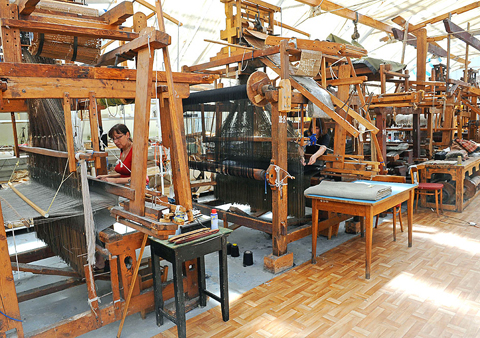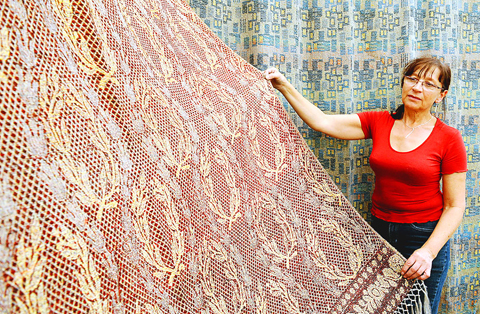The rhythmic clickety-clack of 19th-century hand looms will soon be silenced when what is thought to be the last Jacquard workshop in Europe closes in a few weeks and another traditional art disappears.
Film makers, theaters and interior designers have been keeping the LAD Jacquard fabric workshop in Warsaw alive but the economic crisis has hit all of them very hard.
“We’re in a very difficult economic situation and in a few weeks this, the oldest working Jacquard manufacturer in Europe, will become history,” said Dariusz Makowski, owner of the workshop.

PHOTO: AFP
Makowski is pessimistic that public subsidies can be found.
Invented by Frenchman Joseph Marie Jacquard in the French city of Lyon around 1800, the Jacquard loom was the first to weave complicated patterns. It revolutionized textile manufacturing and paved the way for the mechanized modern textile industry.
“It allowed fabrics with beautiful, intricate designs to be produced much faster and at a much lower cost,” Makowski said.

PHOTO: AFP
“In fact in the 1820s it sparked a labor movement by weavers in Lyon, a great social revolution and the rise of the weavers’ Solidarity union in 1823 to 1825 — much, much sooner than in Poland,” he remarked of the rise of Poland’s historic Solidarity union led by Nobel Prize winner Lech Walesa in 1980.
The Jacquard technique spread across Europe in the 1800s and by the 1840s large manufacturing facilities weaving Jacquard fabrics and rare laces were set up in Poland. But soon machine-operated Jacquard looms replaced their hand-operated ancestors.
“In 1926 they [the hand looms] became the property of the Warsaw Fine Arts academy and later the LAD artists’ co-operative was created. We are their successors,” Makowski said.

PHOTO: AFP
“This is the only remaining working cooperative of the famous ones such as Bauhaus in Germany or the Arts and Crafts Society in London,” he said.
Fifteen years ago he bought 12 19th-century wooden Jacquard looms and an inventory of 509 antique Jacquard patterns from the LAD cooperative which folded in post-communist Poland’s difficult adaptation to the market economy.
Today, the workshop is located in a ramshackle greenhouse in Warsaw’s sprawling Royal Lazienki park.
The revolutionary Jacquard loom was the first to use special punch-hole cards using a binary code to make fabric patterns using a steering mechanism on the top of the loom.
“The machine on top of the loom can be likened to a computer while the punch-card is like a kind of primitive computer program or disc,” said veteran weaver Mariola Nowakowska, 54, who has been working on looms for 30 years.
“The machine reads the punch-card and really you could say it’s a kind of a proto-computer,” she said.
A weaver on a Jacquard hand loom must be physically fit to pump its heavy wooden pedal day in, day out and have the patience of a saint to make sure each of several thousand fine threads is in its rightful place, Nowakowska said.
But the effort is rewarded by the special quality of the product.
“On hand looms fabrics are naturally more supple and light than mechanically made ones as we compact the weave by hand and we don’t have as much strength as the motor running a machine,” Nowakowska said.
An experienced weaver can produce up to 2m of Jacquard cloth per day, but Nowakowska is one of the last possessing the skill to deftly operate a Jacquard loom.
“Essentially, this craft has disappeared. We are just two weavers here and young people just aren’t interested in learning. It’s hard, complicated work. Perhaps there will be someone willing to learn, if not, it will become a museum,” Nowakowska said with a hint of sadness.

MAKING WAVES: China’s maritime militia could become a nontraditional threat in war, clogging up shipping lanes to prevent US or Japanese intervention, a report said About 1,900 Chinese ships flying flags of convenience and fishing vessels that participated in China’s military exercises around Taiwan last month and in January last year have been listed for monitoring, Coast Guard Administration (CGA) Deputy Director-General Hsieh Ching-chin (謝慶欽) said yesterday. Following amendments to the Commercial Port Act (商港法) and the Law of Ships (船舶法) last month, the CGA can designate possible berthing areas or deny ports of call for vessels suspected of loitering around areas where undersea cables can be accessed, Oceans Affairs Council Minister Kuan Bi-ling (管碧玲) said. The list of suspected ships, originally 300, had risen to about

DAREDEVIL: Honnold said it had always been a dream of his to climb Taipei 101, while a Netflix producer said the skyscraper was ‘a real icon of this country’ US climber Alex Honnold yesterday took on Taiwan’s tallest building, becoming the first person to scale Taipei 101 without a rope, harness or safety net. Hundreds of spectators gathered at the base of the 101-story skyscraper to watch Honnold, 40, embark on his daredevil feat, which was also broadcast live on Netflix. Dressed in a red T-shirt and yellow custom-made climbing shoes, Honnold swiftly moved up the southeast face of the glass and steel building. At one point, he stepped onto a platform midway up to wave down at fans and onlookers who were taking photos. People watching from inside

Japan’s strategic alliance with the US would collapse if Tokyo were to turn away from a conflict in Taiwan, Japanese Prime Minister Sanae Takaichi said yesterday, but distanced herself from previous comments that suggested a possible military response in such an event. Takaichi expressed her latest views on a nationally broadcast TV program late on Monday, where an opposition party leader criticized her for igniting tensions with China with the earlier remarks. Ties between Japan and China have sunk to the worst level in years after Takaichi said in November that a hypothetical Chinese attack on Taiwan could bring about a Japanese

The WHO ignored early COVID-19 warnings from Taiwan, US Deputy Secretary of Health and Human Services Jim O’Neill said on Friday, as part of justification for Washington withdrawing from the global health body. US Secretary of State Marco Rubio on Thursday said that the US was pulling out of the UN agency, as it failed to fulfill its responsibilities during the COVID-19 pandemic. The WHO “ignored early COVID warnings from Taiwan in 2019 by pretending Taiwan did not exist, O’Neill wrote on X on Friday, Taiwan time. “It ignored rigorous science and promoted lockdowns.” The US will “continue international coordination on infectious